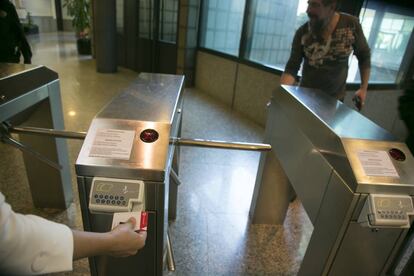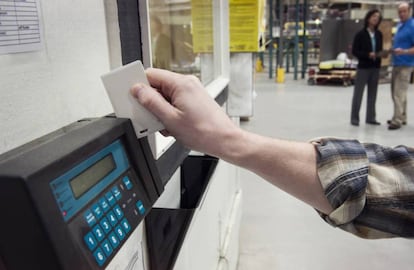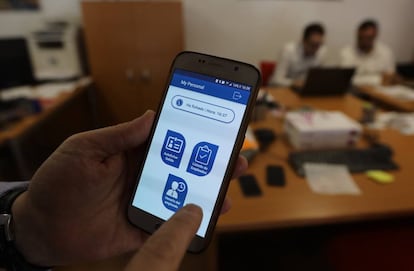Problems on day one of Spain’s new clocking-in system: “This is not going to be useful”
Small businesses are having trouble implementing the new rules, which force all companies, regardless of size, to keep track of worker schedules

More than 24 hours have passed since new rules went into effect in Spain making it mandatory for businesses to keep track of employees’ working hours, and reactions so far are mixed.
A government decree that went into effect on May 12 forces companies of all sizes to keep records of when employees start and end their working day. The goal is to clamp down on unpaid overtime, and failure to comply carries administrative penalties ranging from €626 to €6,250.
We don’t know whether we’re supposed to write it down on a piece of paper, use a time card, or what
Madrid dental clinic worker
While some companies have done little more than tweak their existing systems, others – small businesses in particular – are having trouble adapting to the new rules.
Staff at a dental clinic in the San Blas neighborhood of Madrid said they were clueless as to what they were supposed to do. “The boss is away on a trip and he hasn’t said anything. We don’t know whether we’re supposed to write it down on a piece of paper, use a time card, or what,” said one employee, who added that she was happy about the new system because all her overtime work would finally be reflected and paid. “This is great for me.”
David Martí, an optician who has a store in the same area, does not employ anyone other than himself, and he “assumes” that he does not need to keep records of his own working hours. But he says there has been little available information.

“My understanding is that self-employed people don’t need to do this, but the fact is that nobody has told us anything. In the end, you find out through the media,” he said. According to the new law, self-employed entrepreneurs who employ other people do have an obligation to keep records, while single-employee outfits such as Martí’s do not.
Workers: divided
While some employees are happy with the changes, others think that employers will actually benefit the most. At a retail store called Tiger, for instance, a worker said that they used to keep digital fingerprint records, but now they’ve started to use paper time sheets instead. “It won’t be any use. This is even easier to tamper with than what we had before,” she said.
Mari Luz Gómez, the owner of a cafeteria in the city of Cádiz, describes the new regulations as the “undercover destruction of small businesses.” She feels that more precise record-keeping, which entails more social security payments, is not being introduced with workers in mind, but “just to fatten up the state coffers.”
Yet others see this as a new business opportunity. Docuimpresión XXI, a licensed Xerox retailer, has started to sell a service to help businesses keep these records. José Aurelio Hidalgo, a project analyst at Docuimpresión XXI, says they have already been in touch with “thousands of companies” and that 80 of them have contracted their service, which entails monthly payments.

Most large companies have had an easier time of it, since they already have digital systems to track employee hours. Sources at energy firms Cepsa, Repsol, Iberdrola, Endesa, Naturgy and Red Eléctrica de España said that special systems will be negotiated for staff members with flexible working hours.
While the banking sector is notorious for making workers put in unpaid overtime, sources consulted by this newspaper said that working hours were already being tracked as a result of security measures, and that a new program is being introduced to make the timekeeping more precise. But these sources also said that the sector favors goal-oriented work and flexi-time, for which clocking in and out makes little sense. At Spanish banking giant Santander, a spokesperson said that the bank encourages employees to organize their own work. “Professionals have quite a lot of freedom to compensate for the hours that were worked at times of need.”
Moving forward or back?
The state-run hotel chain Paradores has gone a step further and will introduce a facial recognition system. A company spokesperson said that 58 out of the 98 establishments run by Paradores keep manual records, and the remaining 40 use cards or fingerprints. But glitches with these latter systems have persuaded management to adopt a new technology that it hopes to introduce at all its paradores throughout this year.
Things are a little more complicated in the construction sector, said a workers’ representative for construction and real estate firm Grupo Ortiz. The problem is not with office workers, who already check in through turnstiles, but with those at construction sites. “We’ve reached a deal with the company to revert to an old system we used to have, the listero: a piece of paper kept by the site manager who writes down when people come and go.” This source said that the move means “going back 10 years,” and that some form of electronic control would be better.
English version by Susana Urra.
Tu suscripción se está usando en otro dispositivo
¿Quieres añadir otro usuario a tu suscripción?
Si continúas leyendo en este dispositivo, no se podrá leer en el otro.
FlechaTu suscripción se está usando en otro dispositivo y solo puedes acceder a EL PAÍS desde un dispositivo a la vez.
Si quieres compartir tu cuenta, cambia tu suscripción a la modalidad Premium, así podrás añadir otro usuario. Cada uno accederá con su propia cuenta de email, lo que os permitirá personalizar vuestra experiencia en EL PAÍS.
¿Tienes una suscripción de empresa? Accede aquí para contratar más cuentas.
En el caso de no saber quién está usando tu cuenta, te recomendamos cambiar tu contraseña aquí.
Si decides continuar compartiendo tu cuenta, este mensaje se mostrará en tu dispositivo y en el de la otra persona que está usando tu cuenta de forma indefinida, afectando a tu experiencia de lectura. Puedes consultar aquí los términos y condiciones de la suscripción digital.








































